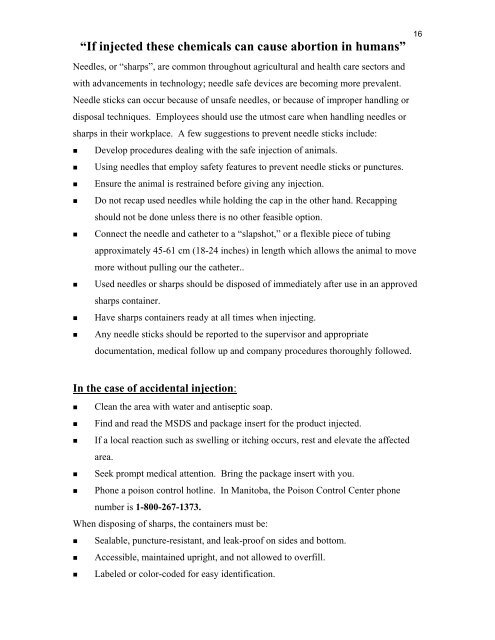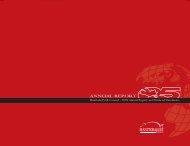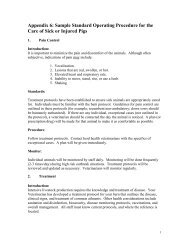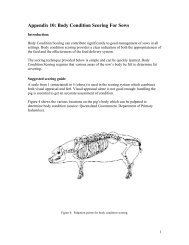Barn Safety - Manitoba Pork Council
Barn Safety - Manitoba Pork Council
Barn Safety - Manitoba Pork Council
Create successful ePaper yourself
Turn your PDF publications into a flip-book with our unique Google optimized e-Paper software.
“If injected these chemicals can cause abortion in humans”<br />
Needles, or “sharps”, are common throughout agricultural and health care sectors and<br />
with advancements in technology; needle safe devices are becoming more prevalent.<br />
Needle sticks can occur because of unsafe needles, or because of improper handling or<br />
disposal techniques. Employees should use the utmost care when handling needles or<br />
sharps in their workplace. A few suggestions to prevent needle sticks include:<br />
• Develop procedures dealing with the safe injection of animals.<br />
• Using needles that employ safety features to prevent needle sticks or punctures.<br />
• Ensure the animal is restrained before giving any injection.<br />
• Do not recap used needles while holding the cap in the other hand. Recapping<br />
should not be done unless there is no other feasible option.<br />
• Connect the needle and catheter to a “slapshot,” or a flexible piece of tubing<br />
approximately 45-61 cm (18-24 inches) in length which allows the animal to move<br />
more without pulling our the catheter..<br />
• Used needles or sharps should be disposed of immediately after use in an approved<br />
sharps container.<br />
• Have sharps containers ready at all times when injecting.<br />
• Any needle sticks should be reported to the supervisor and appropriate<br />
documentation, medical follow up and company procedures thoroughly followed.<br />
16<br />
In the case of accidental injection:<br />
• Clean the area with water and antiseptic soap.<br />
• Find and read the MSDS and package insert for the product injected.<br />
• If a local reaction such as swelling or itching occurs, rest and elevate the affected<br />
area.<br />
• Seek prompt medical attention. Bring the package insert with you.<br />
• Phone a poison control hotline. In <strong>Manitoba</strong>, the Poison Control Center phone<br />
number is 1-800-267-1373.<br />
When disposing of sharps, the containers must be:<br />
• Sealable, puncture-resistant, and leak-proof on sides and bottom.<br />
• Accessible, maintained upright, and not allowed to overfill.<br />
• Labeled or color-coded for easy identification.














